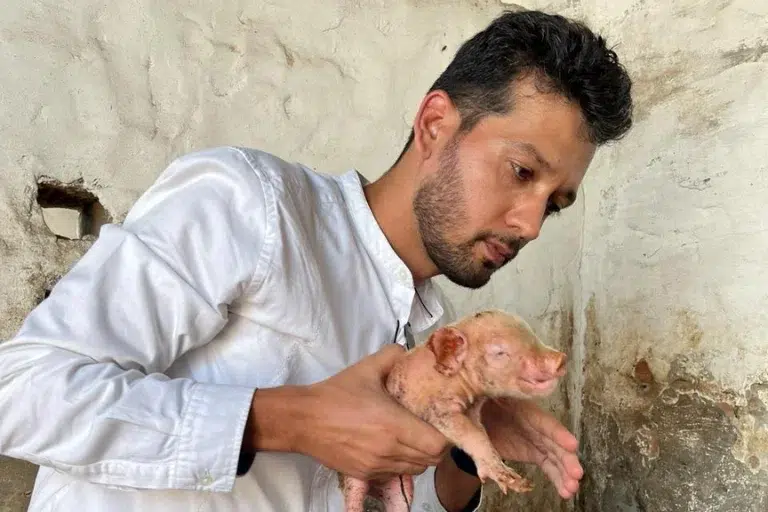
Partner Spotlight | Mercy For Animals India
Nikunj Sharma
Chief Executive Officer | Mercy For Animals India
Interviewed By : Heer Shukla
Heer (IAF): What are the biggest challenges you face as a CEO of Mercy for Animals India, and how does your organisation overcome them?
Nikunj: Driven by a profound passion for activism, I thrive on engaging in hands-on projects that involve overcoming challenges to assist animals directly. Yet, when establishing a new organisation from the ground up, a myriad of operational hurdles surfaces—whether it’s navigating the intricacies of setting up bank accounts, securing grants, or building connections with new faces. Personally, I’ve found striking a balance between operational tasks and campaign efforts to be one of the most formidable challenges. It’s crucial, however, to acknowledge that a robust operational foundation is integral to the organisation’s future well-being. To address this, I’ve adopted a strategy of delegating more operational responsibilities to the team while carving out dedicated time to support the campaigns team in their endeavours.
Recruitment presents another significant challenge, particularly in identifying individuals who share a deep commitment to the animal protection cause and being skilful at the same time. We prioritise hiring from within the movement due to the dedication and proven track records of individuals already aligned with our cause. Ahimsa Fellowship has done a brilliant job in filling this gap. I see that the movement has a greater number of trained professionals than before. Nevertheless, filling specific roles, for departments such as celebrity management or corporate affairs professional, proves challenging at times. These roles may require talent from outside the movement, prompting us to explore and attract individuals who bring unique expertise and perspectives to further our mission.
Heer (IAF): We know Mercy for Animals India has achieved significant policy wins. Can you share an inspiring story of how your advocacy made a tangible difference for animals in India?
Nikunj: I vividly recall a recent experience during my visit to a pig farm in Uttar Pradesh that encapsulates the profound impact of our advocacy. The farm owner expressed his desire to ‘modernise’ the facility by introducing gestation crates, only to lament that animal protection groups and their campaigns were thwarting these plans for him and fellow farmers. It was in that moment that the tangible difference we’ve made in the lives of mother pigs became unmistakably clear.

This impact stems from the concerted efforts of Mercy For Animals India, alongside People For Animals (PFA) and HSI India, in mounting a robust campaign against the use of gestation and farrowing crates. The outcome has been nothing short of remarkable—with more than 26 states now enforcing prohibitions on these crates. In attempting a rough estimate, one can fathom the substantial impact on the lives of nearly 4 million pigs across India. This success story serves as a testament to the real, positive change we can affect through our collective advocacy for the well-being of animals.
Heer (IAF): How does Mercy for Animals India advocate for policies that address both animal welfare and climate concerns, showcasing a broader, systemic approach?
Nikunj: Mercy For Animals India is deeply committed to recognising and addressing the interconnectedness of various issues, particularly the relationship between animal welfare, climate change, and public health. The post-COVID era has seen a heightened awareness among the public regarding healthy and sustainable eating and farming practices. Leveraging this opportunity, MFA India collaborated with the Food Safety Standards Authority of India during COVID to integrate plant-based foods into their impactful ‘Eat Right’ campaign, advocating for vegan labelling standards—a significant success for our organisation.
In the realm of public health, our commitment extends to advancing research on the links between animal agriculture and zoonotic diseases. Through ongoing collaboration with the renowned public health institute, The George Institute of Global Health, we are actively conducting a systematic review and engaging in expert consultations to establish key policy recommendations.
On the global stage, both Mercy For Animals globally and MFA India are taking a prominent role in world climate conferences, exemplified by our engagement at COP 28 in Dubai. Our focus revolves around critical themes such as sustainable food systems and food security, ensuring that our advocacy aligns with the broader environmental agenda. Additionally, our team members have applied for ‘YOUNGO’ and ‘Yuwaah’ memberships with the United Nations, providing a platform for active engagement in environmentally focused initiatives.
In our efforts to highlight the link between animal agriculture and climate change, we collaborate with climate ambassadors. Currently, MFA India is privileged to be supported by the esteemed ‘She Changes Climate’ ambassador for India, Ms. Shreya Ghodawat. A noteworthy event that we co-hosted in 2023, named ‘Meatless Meet More,’ brought together diverse stakeholders, including think tanks, entrepreneurs, organisations, plant-based food businesses, and celebrities. This pioneering event provided a platform to discuss the profound impact of animal-derived foods on health and climate change, showcasing our holistic approach to addressing these interconnected challenges.

